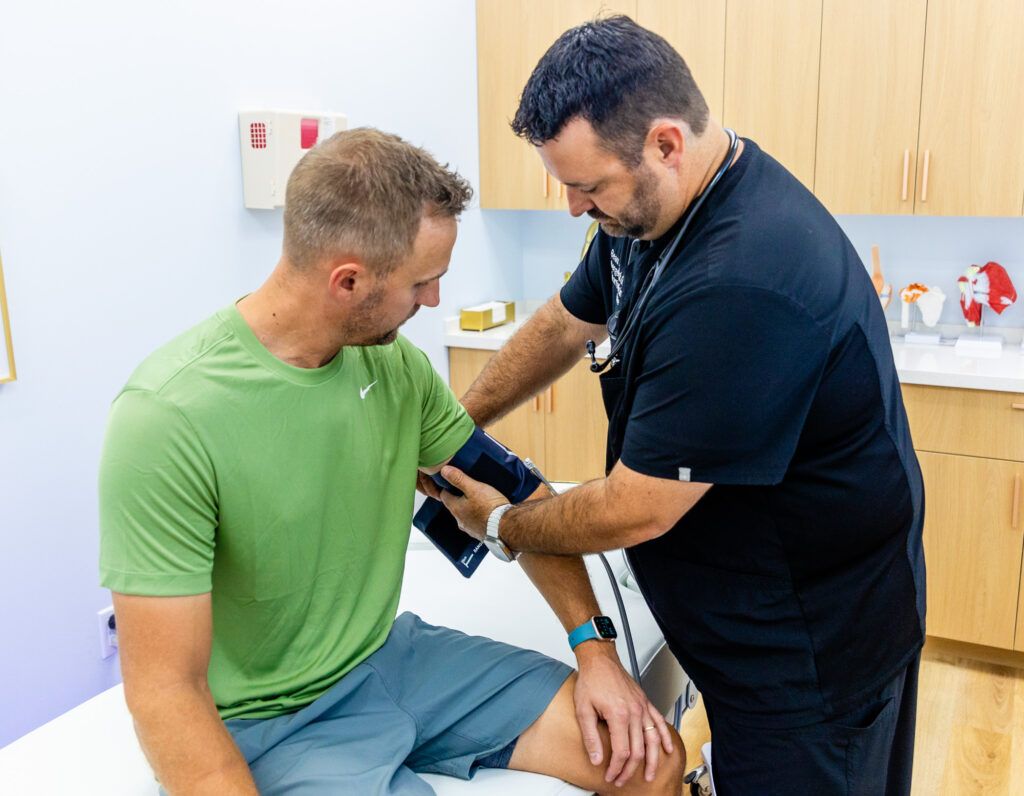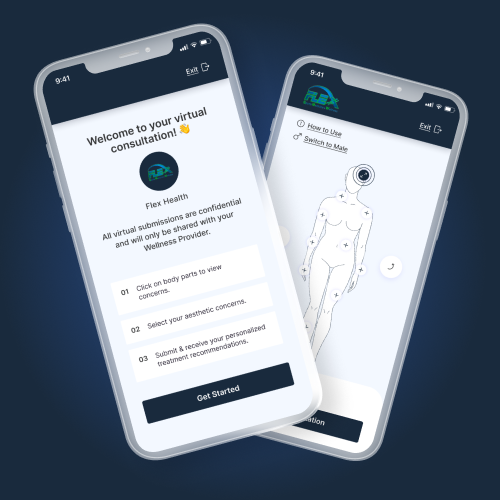Flex Health provides evidence-based, personalized hormone replacement therapy for women navigating perimenopause and menopause. Our medical team listens first, tests thoughtfully, and tailors a plan—so you can sleep better, think clearer, and live more comfortably.
At a glance
-
Personalized plans using bioidentical hormones when appropriate
-
Options: transdermal patches/gels, capsules, and injectables
-
Thoughtful lab work when necessary and follow-up every 12 weeks until stable
-
Clear education on benefits, risks, and alternatives
-
Concierge-level access for questions between visits
Who HRT Can Help
You may benefit from an HRT evaluation if you’re experiencing:
-
Irregular or heavy periods, hot flashes, night sweats
-
Brain fog, mood changes, anxiety or irritability
-
Sleep disruption, fatigue, reduced libido, vaginal dryness
-
Joint aches, new weight redistribution, or decreased exercise recovery
Perimenopause often begins in the 40s (sometimes late 30s); menopause is defined as 12 months without a period. We support both stages.
Why Consider HRT?
Modern, appropriately dosed HRT can help:
-
Reduce vasomotor symptoms (hot flashes/night sweats)
-
Improve sleep quality and mood
-
Support cognitive clarity and daily productivity
-
Preserve bone density and reduce fracture risk
-
Improve genitourinary symptoms (vaginal dryness, discomfort, frequent UTIs) and sexual well-being
Your plan is individualized based on history, goals, and risk profile.
Comprehensive intake: We start with a deep dive into your medical history, cycle timeline, family history, and a full review of symptoms. This guides whether HRT is even appropriate before we consider prescriptions.
Thoughtful use of labs (not over-testing): At Flex Health, we don’t rely on routine, blanket hormone panels to determine candidacy for HRT. Here’s why:
-
-
-
Symptoms tell the story. Menopause and perimenopause are clinical diagnoses. Lab values often fluctuate wildly day-to-day and don’t always reflect how you feel.
-
Evidence-based approach. Leading medical societies (like the North American Menopause Society and ACOG) recommend basing treatment on history and symptoms—not on numbers alone.
-
When labs do help. We order tests when they change management or identify risks—such as thyroid issues, metabolic concerns, unexplained bleeding, or younger women with irregular cycles where PCOS or ovarian insufficiency may be in play.
-
Less waste, more clarity. Avoiding unnecessary testing keeps care affordable, focused, and meaningful for you.
-
-
Shared decision-making: Together we review your options—hormonal and non-hormonal—so you feel informed and empowered.
Precise dosing & delivery: We select the safest, most effective dose and route (patch, capsule, gel, or injectable) tailored to your needs.
Follow-up & monitoring: We check in at 12 weeks to fine-tune therapy and then every 6–12 months once stable, always coordinating with your preventive screenings.
HRT Options at Flex Health
-
Estrogen therapy (primarily transdermal estradiol via patch or gel for steady levels and favorable clot risk profile).
-
Progesterone (oral micronized progesterone for anyone with a uterus to protect the endometrium; may also support sleep).
-
Testosterone (female-physiologic dosing) for low desire or specific indications, after thorough evaluation.
Safety, Risks & Candidacy
Most healthy women within 10 years of menopause onset and under age 60 are potential candidates. HRT is not for everyone. We avoid or take special precautions with: history of estrogen-sensitive cancers, active liver disease, unexplained vaginal bleeding, prior blood clots/stroke, or uncontrolled cardiovascular risks. If HRT isn’t right for you, we’ll outline effective non-hormonal therapies.
Why We Do Not Offer Pellet Therapy
At Flex Health, we do not support pellet implantation as a hormone delivery system. While some clinics promote pellets for convenience, we believe the risks outweigh the benefits:
-
Procedure-related risks: insertion can cause bleeding, bruising, and scar tissue formation at the site.
-
Dosing challenges: once inserted, pellets cannot be adjusted or removed easily. This makes safe titration difficult and can result in hormone levels that are too high for too long. – Excessively high or prolonged dosing with testosterone can lead to irreversible changes such as deepening of the voice, excess hair growth, and clitoral enlargement.
-
Potential long-term concerns: there are also anecdotal reports of increased cancer risk with supraphysiologic pellet dosing.
For these reasons, we prioritize safer, adjustable, evidence-based hormone delivery methods such as transdermal patches, gels, oral micronized progesterone, and carefully titrated testosterone when appropriate.
Possible Symptoms of a Hormone Imbalance in Women
Discover common signs of hormone imbalance in women—fatigue, mood swings, hot flashes, weight changes & more.
Acid reflux/GERD
Arthralgia/Arthritis
Belly fat
Brittle nails
Dental problems
Dry eyes
Electric shocks
Headaches
Incontinence
Itchy ears
Migraines
Pain during sex
Thinning hair
TMJ
Vertigo
Acne
Asthma
Body odor
Chronic cough
Depression
Dry mouth
Fibromyalgia
Heart palpitations
Insulin resistance
Itchy skin
Night sweats
Sarcopenia
Thinning skin
Unwanted hair
Weight gain
Alcohol tolerance changes
Autoimmune disease
Brain fog
Crawling skin
Difficulty concentrating
Dry skin
Frozen shoulder
High cholesterol/TG
IBS
Kidney stones
Non-alc fatty liver disease
Sleep apnea
Tingling sensations
Frequent UTIs
Wrinkles
Anxiety
Bloating
Breast tenderness
Decreased libido
Dizzy spells
Eczema
GU syndrome
Hot flashes
Irritability
Memory issues
Osteoporosis
Sleep disturbances
Tinnitus
Vaginal dryness
“Not feeling like myself”



Start Feeling Better Today
Schedule an appointment, and start your journey to feeling more like yourself at our clinic in Evans today.


Best Paired Treatments
For the right patient and dose, modern HRT can be safe and effective. We individualize therapy, favor transdermal estradiol when appropriate, and use the lowest effective dose with ongoing monitoring.
HRT is not a weight-gain medication. Many women find that better sleep, symptom relief, and strength training help body composition. Nutrition and movement remain key.
Yes—when using systemic estrogen, progesterone protects the uterine lining. Micronized progesterone is commonly well-tolerated and may aid sleep.
Systemic HRT can help some women; local vaginal estrogen is highly effective for dryness and discomfort and is often used with or without systemic therapy.
Often yes, with careful selection of route (transdermal) and dose. We’ll review your migraine history and triggers.
There’s no one-size timeline. Many women benefit within the menopausal transition and early post-menopause. We reassess benefits/risks at least annually.





